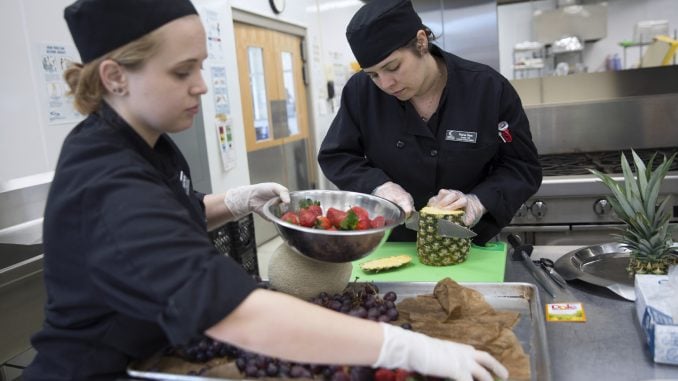
PITTSBORO Sustainability has a complex definition. It is in essence the theory that our health, well-being, and survival depend directly or indirectly on the natural environment. The three pillars of sustainability are economic, environmental, and social. Those are often shortened by scientists to people, planet, and profit. Practices like farm-to-table food movements, building homes requiring less energy, or growing crops organically can all be forms of sustainability.Central Carolina Community College, with campuses in Chatham, Harnett, and Lee counties, is host to “Green Central,” a specially designed curriculum and continuing education program supporting sustainability through agriculture, technology, and the culinary arts.”Food, housing, and energy, with energy having become part of a basic need, have become the three pillars essential to living,” said Andrew McMahan, department chair for sustainability.”Sustainable programs are helping students look at the world with a broader perspective by making the students more prepared and informed about the world around them.”Sustainable AgricultureCentral Carolina owns approximately five acres of land which is entirely student-farmed. Students survey the soil, create a crop rotation plan, dig in the dirt, plant their crops, and watch them grow to harvest all the while using sustainable methods.”This is a student-run farm where our students use their hands to apply what they are learning in the classroom by taking care of the soil, planting crops, and harvesting them,” said James Fry, agricultural instructor and farm manager.”We are giving students the knowledge and experience needed to plan out a farm with a good crop rotation, to make a decision on whether to farm organically, to know how to grow products that are good for people, good for the environment, and a good profit for themselves.”The farm includes crops such as peas, beets, onions, carrots, turnips, radishes, strawberries, blackberries, herbs, broccoli, cabbage, kale, tomatoes, and eggplants.Students are examining what crops are harvestable, the problems of pests, the value of crop rotation, the nourishment of soil, the marketing strategies for farms, how to understand government policy and farming regulations, and holistic approaches, to name a few.The food grown on the farm is then used for a dual-purpose of providing food for the culinary program and for Community Supported Agriculture (CSA) boxes for faculty, staff, and students.For $20 a week, CSA members are given certified and organically grown produce from the college’s farm. The profits from the sales are returned to the farm as the cycle of growing and giving continues.”We are integrating our programs. The food we give the culinary program allows for them to create seasonal menus of various items to prepare and serve in our cafes. The food scraps from preparation are given back to us, and we turn those into compost, the worms feed on the compost, and we continue the growth cycle,” Fry added.Sustainable Culinary ArtsUsing the food straight from the farm on campus, students in the culinary program are preparing dishes to feed their neighbors.The culinary arts program offers continuing education and curriculum classes which cover teaching culinary terms and skill sets, emphasis on the farm-to-table movement and sustainability, supporting local farms and the community, nutrition, wellness, and cuisine.”We are a classic culinary program with a more modern focus. We’re teaching the natural, farm-to-table movement, with a focus on sustainable methods and menu designs,” said Gregg Hamm, chef and executive director of the college’s culinary institute.Students get hands-on experience in the kitchen as they cook, serve, and operate the college’s three cafes Cougar Cafe in Lee County, Dunn Center in Harnett County, and the Natural Chef Cafe in Chatham County which are also open to the public.”The cafes are completely student-operated from the purchasing of foods to menu selection to cooking and serving,” said Hamm. “Students are learning dining room skills, table setting, catering, event planning and management, and how to be short order and line cooks,” said Hamm.Students in the curriculum program are obtaining 120 hours of live culinary experiences while using sustainable practices.”For example, you can have a bucket of scraps in the kitchen and in turn can use those scraps to feed the goats on the farm,” said Hamm. “Little things can make a big difference in sustainability. From feeding the animals to prospering planning of seasonal ingredients to supporting the environment wherever you go.”Sustainable culinary skills also include understanding nutrition, animal rights and welfare, and making quality purchases in selecting ingredients. Program classes include learning how to cook dishes for those with cancer and diabetes, or gluten and dairy-free needs.”Your choices make a huge difference on the health and wellness of you and the environment,” Hamm added.Sustainable Building Construction and TechnologiesEfficiency in heating and cooling a home, heat-reflecting roofs, and the use of natural woods are a few parts that can be found in sustainable building construction and technologies.Students within this program are given the opportunity to build and construct a small house from the ground to the roof that is later auctioned off to the highest bidder.”Small houses are an alternate to more traditional housing scenarios. Students love it as it ups the learning bar as students are building a house someone will actually live in,” said Jeff Gannon, green building instructor.The 550-square-foot house contains one bedroom and bath, and comes with a kitchenette, washer and dryer nook, closet, loft, and 160-square-foot porch. The high-tech and energy efficient home features natural wood from local suppliers, polyisoprene rigged insulation, and a galvalume metal roof with a 4-foot overhang.”Students are completing 90 percent of the house by doing everything from framing, wiring, and plumbing to roof and design work,” said Gannon. “Students are leaving the program with a solid foundation in construction technology.”After the completion of the small house, the college hosts an auction with the proceeds going back into the program to fund the building of the next house. Students have completed four houses thus far with the last house being sold at an auction for $50,000.People. Planet. Profit. Those are essentially the three pillars needed for sustainability, and Central Carolina Community College is ensuring students are adapting and supporting those pillars.



